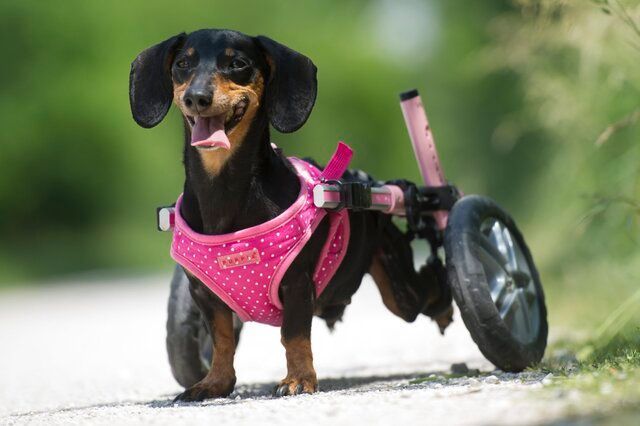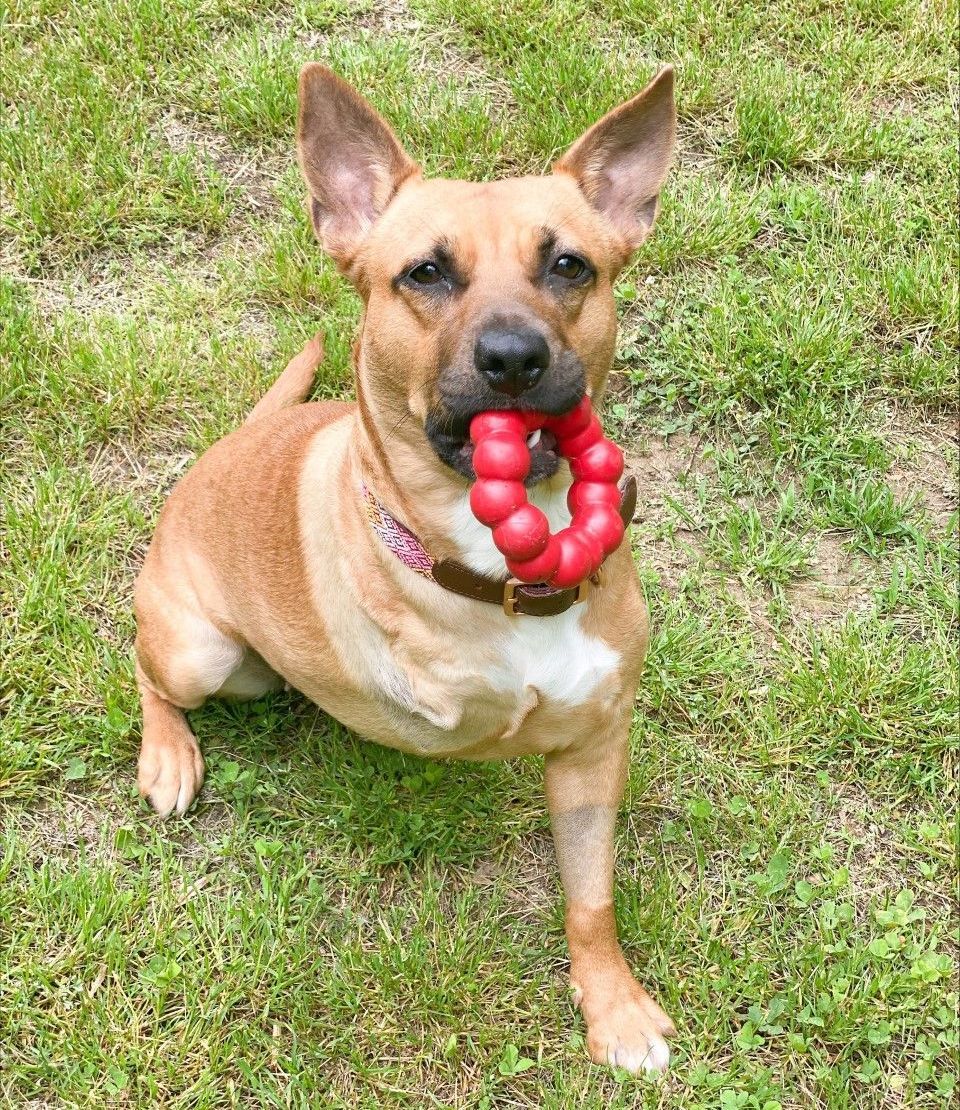Obedience Training For Handicapped Dogs
Obedience Training Meets Adaptation
All dogs have one thing in common: the societal pressure to be a “good dog.” Adopting and raising a handicapped dog is a wonderful humane act. However, whatever limitations your dog may face does not make them immune to societal expectations. Thankfully, obedience training is an enriching activity that can be achieved by any dog, regardless of their limitations, and is the first step toward helping your dog adjust to living in a high pressure world.
The first step for a dog obedience trainer is to identify your dog’s limitations. Understanding what caused your dog's disability will give the trainer insight into how your dog needs to be communicated with, helps the trainer set reasonable expectations, and also helps your dog’s trainer avoid any pain points on your furry family member. Similar to human beings, disabilities in dogs can arise due to various reasons. Some dogs are born with disabilities, while others may become handicapped due to congenital or contracted diseases or injury. It is quite common for a dog to experience blindness, deafness, or experience mobility challenges that can require training modifications. An expert dog obedience trainer will be able to create a training program for your dog that will help your dog to avoid painful movement and have fun while learning new skills. Your dog’s trainer will also be able to take advantage of your dog’s heightened senses to help make adaptive learning possible. Focusing on your dog’s available senses will help you as the owner understand your dog’s strengths and weaknesses and rethink the way your dog needs to be communicated with. With all of this in mind, the obedience trainer will be able to put together an adaptive learning plan to suit your dog and its unique needs.
Speak With A Dog
Training Expert
Speak With A Dog Training Expert
Thank you for contacting us!
We will contact you shortly!
Please try again later.
Obedience Training Meets Adaptation
All dogs have one thing in common: the societal pressure to be a “good dog.” Adopting and raising a handicapped dog is a wonderful humane act. However, whatever limitations your dog may face does not make them immune to societal expectations. Thankfully, obedience training is an enriching activity that can be achieved by any dog, regardless of their limitations, and is the first step toward helping your dog adjust to living in a high pressure world.
The first step for a dog obedience trainer is to identify your dog’s limitations. Understanding what caused your dog's disability will give the trainer insight into how your dog needs to be communicated with, helps the trainer set reasonable expectations, and also helps your dog’s trainer avoid any pain points on your furry family member. Similar to human beings, disabilities in dogs can
Speak With A Dog
Training Expert
Speak With A Dog Training Expert
Thank you for contacting us!
We will contact you shortly!
Please try again later.
arise due to various reasons. Some dogs are born with disabilities, while others may become handicapped due to congenital or contracted diseases or injury. It is quite common for a dog to experience blindness, deafness, or experience mobility challenges that can require training modifications. An expert dog obedience trainer will be able to create a training program for your dog that will help your dog to avoid painful movement and have fun while learning new skills. Your dog’s trainer will also be able to take advantage of your dog’s heightened senses to help make adaptive learning possible. Focusing on your dog’s available senses will help you as the owner understand your dog’s strengths and weaknesses and rethink the way your dog needs to be communicated with. With all of this in mind, the obedience trainer will be able to put together an adaptive learning plan to suit your dog and its unique needs.


Preparing Your Home For A Disabled Dog
First and foremost, it is important to remind any dog owner or future dog owner that owning any pet is a lifetime commitment. It is crucial that your dog is fully integrated into your everyday life and that it knows you are dedicated to ongoing care for it. Time is an aspect of dedication towards your dog. Adopting or owning a disabled dog requires time invested into researching and understanding your dog's limitations. Time is also required for dedicated training and working with your disabled dog. A lot of patience and attention to training is needed compared to a fully able dog, and alternative training techniques created by a professional trainer can be time consuming.
The financial responsibility of caring for a disabled dog is another factor to consider when making this life long commitment. While some disabilities do not require medical intervention, others may require ongoing treatment or medical expenses is the disability has the potential to worsen as the
Preparing Your Home For A Disabled Dog
First and foremost, it is important to remind any dog owner or future dog owner that owning any pet is a lifetime commitment. It is crucial that your dog is fully integrated into your everyday life and that it knows you are dedicated to ongoing care for it. Time is an aspect of dedication towards your dog. Adopting or owning a disabled dog requires time invested into researching and understanding your dog's limitations. Time is also required for dedicated training and working with your disabled dog. A lot of patience and attention to training is needed compared to a fully able dog, and alternative training techniques created by a professional trainer can be time consuming.
The financial responsibility of caring for a disabled dog is another factor to consider when making this life long commitment. While some disabilities do not require medical intervention, others may require ongoing treatment or medical expenses is the disability has the potential to worsen as the dog ages. Tools are another financial investment needed to help a dog’s limitations adapt to its environment. For example, a head collar or halter may be needed to help a blind dog navigate new spaces by preventing it from bumping into barriers. If your dog has a mobility handicap, a dog cart or lifting harness can be used to help your dog move around without much pain. Private obedience training classes are also another crucial investment for helping you and your dog adapt to its lifestyle in its home and social environments. An obedience trainer will help you teach your handicapped dog how to associate obedience with good things through positive reinforcement. The trainer will also help you learn how to be observant to your dog's signals and cues for communicating its needs. The obedience trainer will also help to nurture a great relationship between you and your handicapped dog by prioritizing simple obedience instructions for you and your dog to learn together.
Dogs are remarkable creatures. Owning a dog with a handicap can help you learn new ways to look at and adapt to the world around you. While a dog’s disabilities can make obedience training more challenging, Enrolling your disabled dog into an obedience training program will expand their ability to live a full and rewarding life.
dog ages. Tools are another financial investment needed to help a dog’s limitations adapt to its environment. For example, a head collar or halter may be needed to help a blind dog navigate new spaces by preventing it from bumping into barriers. If your dog has a mobility handicap, a dog cart or lifting harness can be used to help your dog move around without much pain. Private obedience training classes are also another crucial investment for helping you and your dog adapt to its lifestyle in its home and social environments. An obedience trainer will help you teach your handicapped dog how to associate obedience with good things through positive reinforcement. The trainer will also help you learn how to be observant to your dog's signals and cues for communicating its needs. The obedience trainer will also help to nurture a great relationship between you and your handicapped dog by prioritizing simple obedience instructions for you and your dog to learn together.
Dogs are remarkable creatures. Owning a dog with a handicap can help you learn new ways to look at and adapt to the world around you. While a dog’s disabilities can make obedience training more challenging, Enrolling your disabled dog into an obedience training program will expand their ability to live a full and rewarding life.
